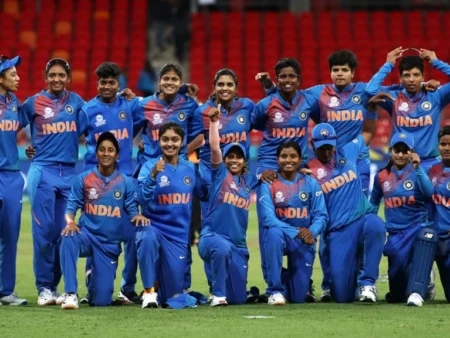
Sports fans all over the world are drawn to online betting, and cricket-mad nations like India are big fans of this activity and spend their time on online betting for cricket.
Fans can now wager on their preferred teams and players from the comfort of their homes more easily than ever thanks to the development of internet platforms. Online betting for cricket has becoming more popular due to its convenience and the thrill of perhaps earning money.
This trend is amplified greatly by one of the sport’s most important championships, the Cricket World Cup. Millions of cricket fans watch the action with bated breath as the best cricketing nations in the world compete. The matches are a tempting proposition for bettors due to their huge stakes and unpredictable nature. Throughout the World Cup, online betting for cricket sites see an increase in traffic as gamblers wager on a wide range of events, including player performances and match results. This increased attention highlights the convergence of sports fandom and the excitement of betting, turning the tournament into a focal point for both casual and serious bettors.
Current Legal Framework
The absence of particular national legislation pertaining to online gambling has resulted in a complex and rather ambiguous legal landscape for online betting for cricket in India. State laws regulate gambling operations to a wide extent, resulting in a patchwork of regulations that differ greatly across the nation.
- The main federal law governing gambling in India is the Central Regulations Public Gambling Act, 1867. It forbids managing or operating a gambling establishment that is open to the public. However, this Act was enacted long before the advent of online gambling and does not specifically address online betting.
- While it does not specifically address online betting, this Act governs cyber activity in India. It contains clauses that are construed to regulate online gambling sites, in particular in relation to the dissemination of illicit material via the internet.
State Laws
- Sikkim: One of the few states with laws specifically permitting internet betting within its borders is Sikkim. The state government is able to grant licenses to online betting firms under the Sikkim Online Gaming (Regulation) Act, 2008.
- Goa and Daman: These two states also have laxer gambling regulations that permit some types of gambling, including some online sports betting.
- Maharashtra: All forms of gambling, including internet betting, are outlawed by the Maharashtra Prevention of Gambling Act of 1887
Interpretation and grey areas
There are a lot of murky areas because there isn’t a comprehensive federal law covering online betting.
- Chance vs. Skill: In general, games of chance and skill are distinguished by Indian law. Putting money on skill-based games like Sports requiring ability, like horse racing, are frequently seen as lawful, whereas wagering on games of chance is usually forbidden. The question of whether betting on cricket is more about chance or skill is still up for debate.
- Foreign Online Sportsbooks: International betting sites that are based outside of Indian law are frequently used by Indian gamblers. Although it is not specifically unlawful to access these websites from India, there are risks associated with using such platforms, including those linked to money transfer and fraud.
Important Legal Acts and What They Mean
Act on Public Gambling, 1867: It is the foundation of Indian gambling legislation, however it is out of date; it forbids running or entering a public gaming establishment. State courts frequently construe its indirect relevance to internet betting.
The Information Technology Act of 2000: Includes measures to prohibit websites that encourage illicit activity, such as gambling. Nonetheless, there are still a lot of betting sites online, and enforcement is patchy.
Act for the Management of Foreign Exchange (FEMA), 1999: Financial transactions across borders are governed by this Act. When using foreign betting sites, one must transact in foreign currencies, which if done outside of legal channels, may be against FEMA regulations.
There are regional differences and uncertainty in India’s current online betting laws. There are a lot of legal gray areas in the United States because most state laws date back before the digital era, even if some states have taken action to control online betting. In order to maintain compliance, bettors and operators must carefully traverse this complicated landscape and remain knowledgeable about both federal and state legislation.to guarantee adherence and prevent legal problems.
State-by-state variations in Law
State-by-state variations exist in India’s legal framework for gambling, including internet betting. This difference results from the fact that gambling is a state matter, meaning that each state is free to create its own regulations. Here is a thorough analysis of the legality of internet gambling in each of India’s states:
States like Sikkim where online betting is legal
Sikkim Online Gaming (Regulation) Act, 2008 provides the legal framework. Sikkim is one of the few states that has laws that specifically permit internet gambling. Operators are granted licenses by the state government to provide a range of online gaming and betting services within the state.
Daman & Diu as well as Goa
Goa, Daman, and Diu Public Gambling Act, 1976 provides the legal framework. These states permit a variety of gambling activities, such as land-based casinos and some encompassing both physical casinos and certain online gambling ventures. Though there are less explicit regulations for internet betting than in Sikkim, overall regulatory conditions are quite lenient.
States with ambiguous or restrictive laws
- Maharashtra: Maharashtra Prevention of Gambling Act, 1887, provides the legal framework. The state of Maharashtra has strict anti-gambling laws that specifically forbid the majority of betting activities, including internet betting. The state is renowned for applying these regulations strictly.
- Karnataka: Karnataka Police Act, 1963 provides the legal framework. Karnataka’s gaming rules have generally been tight. Recent changes have been made to the legislation to make them more stricter, namely outlawing online betting and gambling.
- Telangana: Telangana State Gaming (Amendment) Act, 2017 provides the legal framework. Telangana has adopted a strong position opposing all types of of gaming, encompassing virtual wagering. Its gaming laws were amended in 2017 and now specifically forbid internet betting and gambling.
- Tamil Nadu: Tamil Nadu Gaming and Police Laws (Amendment) Act, 2021 provides the framework for the law. Tamil Nadu has proposed changes to its gaming regulations that prohibit betting and gambling on the internet. Although there are still legal challenges against these statutes, they now have severe limitations.
- Andhra Pradesh: Andhra Pradesh Gaming (Amendment) Act, 2020 is the legal framework. Andhra Pradesh has changed its gaming laws to outlaw internet gambling and betting, just like Telangana has done. This shows that the state has a strict regulatory position against these activities.
States with Defined or Permissive Laws
- West Bengal : In terms of permissiveness, West Bengal is to specific types of gambling and betting. The state has laxer laws for other types of gambling and permits horse racing wagering; nevertheless, there are no clear rules regarding internet betting.
- Nagaland: Online skill games are legal in Nagaland as per Nagaland Prohibition of Gambling and Promotion and Regulation of Online Games of Skill Act, 2016 and may involve some forms of betting if they are judged to be skill-based. This offers a framework for lawful regulation that could make certain types of internet gambling acceptable.
The topic of online betting has not been specifically addressed by many Indian states in their legal frameworks. Because there is no explicit regulation in place in these jurisdictions, there is a gray area surrounding the legality of Online betting is neither expressly banned nor permitted to be legal.
Significance for Gamblers in States with Restrictions
Bettors in states with confusing or restrictive laws run a serious danger of suffering from the following:
- Legal Repercussions: If internet betting is done in a state where it is not allowed, there may be penalties and jail time.
- Financial Risks: Bettors are at danger of fraud, non-payment of winnings, and other financial issues while using foreign or unregulated sites.
- Absence of Consumer Protection: In the event of a dispute with a betting provider, bettors have little legal options.
Impact of the Cricket World Cup on Online Betting
One of the most eagerly awaited sporting events in the world is the Cricket World Cup, especially in cricket-mad nations like India. It has a huge effect on online betting for cricket since the competition attracts a lot of viewers and participants, which fosters a favorable environment for betting. Here’s a thorough analysis of how internet betting is impacted by the Cricket World Cup:
- There is a noticeable surge in online betting for cricket during the Cricket World Cup. Because they are so passionate about the game, fans and aficionados are more likely to wager on different parts of the matches, such as player performances or match results.
- Since the World Cup is a high-stakes competition, there are typically larger betting limits on online betting for cricket. Bettors are more inclined to place large bets.There is an increased willingness among bettors to place large bets, which heightens the intensity and excitement of the betting environment.
- Match Results: During the World Cup, one of the most common bets is on which team will win a specific match. There is a lot of interest in betting on individual performances, such as the best scorer or the quantity of wickets a bowler takes.
- Due to the dynamic nature of the game, there is a lot of in-play betting available. During a match, online betting for cricket bettors can put bets on a variety of emerging scenarios, such as the outcome of the next ball, session runs, etc.
- A lot of people are registering and using online betting for cricket sites. These platforms frequently provide unique incentives and promotions to draw in new members and keep existing ones.keep the ones that already exist.
- The ease with which fans can now place real-time bets thanks to mobile apps, online betting for cricket has increased the amount of online betting that occurs during the World Cup.
- During the World Cup, online betting for cricket sites run strong marketing campaigns. To attract wagerers, these consist casino promos, exclusive deals, and higher odds.
- To increase awareness and further incorporate betting into the cricket experience, some bookmakers may sponsor teams or events.
- Regulatory organizations frequently boost their surveillance of the World Cup betting activity. Governments and regulatory bodies may increase their monitoring in order to stop match-fixing and illicit online betting for cricket.
- During significant competitions, there is a greater emphasis on responsible online betting for cricket. Platforms encourage ethical betting behavior and give users the tools they need to control their gaming.
Impact on Society and Economy
Through taxes and earnings for authorized betting operators, the growth in betting may have a considerable positive impact on the economy.
- Problem gambling is a worry that is brought up by the increased betting activity. Gambling addiction is more likely to occur, which has led to requests for stronger support networks and laws to safeguard those who are more susceptible.
- Because of the World Cup’s widespread viewership, wagering is not restricted to a single area. An active and competitive betting market is created by the increased participation of international betting platforms from different countries.
- When bettors from nations where internet gambling is prohibited use foreign sites, it creates questions about jurisdiction and law enforcement.
- Online betting for cricket is significantly impacted by the Cricket World Cup, which also stimulates economic activity, innovation, and engagement. While it enhances excitement for bettors and offers profitable opportunities for betting platforms.
- it also calls for stricter regulations and responsible online betting for cricket procedures to reduce the hazards involved. The competition is becoming increasingly important to industry stakeholders as its popularity grows and it is expected to have a greater impact on the online betting for cricket scene.
Safe and Legal Online Betting Practices
If you play responsibly and with prudence, online betting for cricket can be a fun and even lucrative pastime. In order to guarantee that your online betting experience is both secure and compliant, follow these crucial guidelines:
- Place your bets only on websites that are regulated and licensed by respectable organizations. This guarantees that the platform abides by stringent security, fairness, and client protection criteria.
- Seek out platforms certified by internationally renowned organizations like the Malta Gaming Authority or the UK Gambling Commission, or state-level licenses like Sikkim and Nagaland in India.
- Verify whether the betting site protects your financial and personal information using safe encryption technologies, such as SSL.
- Seek out methods of payment that Seek out payment methods like bank transfers, e-wallets, and credit/debit cards that are reputable for being secure.
- Examine the platform’s standing by perusing user feedback and rankings on unbiased websites and discussion boards.
- Steer clear of websites that have a lot of complaints regarding unpaid bills or subpar customer support.
Comprehending the terms and conditions
- Read the terms and conditions carefully, paying close attention to the parts on bonus terms, withdrawal guidelines, and betting regulations.
- Make sure you comprehend the rules of the platform regarding wager limitations, payout schedules, and any associated costs.
- Select sites that provide tools for responsible gaming, like deposit caps, self-exclusion choices, and links to problem gambling help services.
- Seek out payment methods like bank transfers, e-wallets, and credit/debit cards that are reputable for being secure.
- Examine the platform’s standing by perusing user feedback and rankings on unbiased websites and discussion boards.
- Steer clear of websites that have a lot of complaints regarding unpaid bills or subpar customer support.
- Read the terms and conditions carefully, paying close attention to the parts on bonus terms, withdrawal guidelines, and online betting for cricket regulations.
- Make sure you comprehend the rules of the platform regarding wager limitations, payout schedules, and any associated costs.
- Select sites that provide tools for responsible gaming, like deposit caps, self-exclusion choices, and links to problem gambling help services.
- Keep yourself updated about whether online betting for cricket is permitted in your state or nation. It is essential to abide by local legislation in order to prevent legal problems.
- Make use of payment options that are accepted by law and adhere to regional financial norms. This guarantees the security of your funds and lowers the possibility of transaction problems.
- Winnings from betting could be taxable in some places. Make sure you abide by tax laws in order to prevent legal avert any legal complexities.
- Recognize the warning indicators of problem gambling, which include lying about your betting habits, betting more than you can afford, and experiencing restlessness or irritability when attempting to cut back.
- Make use of the resources and support systems offered to problem gamblers.
- Selecting reliable sites, reading and following terms and conditions, adopting responsible betting practices, and keeping up with regional laws and regulations are all necessary for safe and legal online betting for cricket .You may minimize risks and maximize enjoyment from your betting by adhering to these rules.
Conclusion
In India, the legal framework around online betting for cricket is a patchwork of differing rules that primarily rely on state-specific legislation. While some states, like Maharashtra and Telangana, have strict restrictions against internet betting, others, like Sikkim and Nagaland, have frameworks that allow and regulate some types of it. In order to maintain compliance and reduce legal risks, bettors must carefully traverse this complicated legal landscape and stay up to date on the laws in their individual jurisdictions.
















